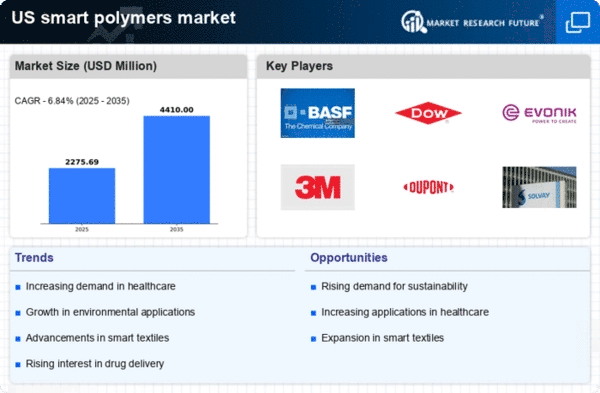The smart polymers market exhibits a dynamic competitive landscape characterized by rapid innovation and strategic collaborations. Key growth drivers include the increasing demand for advanced materials in sectors such as healthcare, automotive, and electronics. Major players like BASF SE (Germany), Dow Inc. (US), and 3M Company (US) are strategically positioned to leverage their extensive R&D capabilities and global reach. BASF SE (Germany) focuses on sustainable solutions, while Dow Inc. (US) emphasizes digital transformation and smart manufacturing. 3M Company (US) is known for its innovation in adhesive technologies, which enhances its competitive edge. Collectively, these strategies foster a robust environment where innovation and sustainability are paramount.In terms of business tactics, companies are increasingly localizing manufacturing to enhance supply chain resilience and reduce lead times. The market structure appears moderately fragmented, with several players vying for market share. However, the collective influence of key players like Evonik Industries AG (Germany) and DuPont de Nemours Inc. (US) suggests a trend towards consolidation, as these companies seek to optimize their operations and expand their product offerings.
In October Dow Inc. (US) announced a partnership with a leading tech firm to develop AI-driven smart polymers aimed at enhancing energy efficiency in construction materials. This strategic move underscores Dow's commitment to integrating advanced technologies into its product lines, potentially setting a new standard for energy-efficient materials in the industry. The collaboration is likely to enhance Dow's market position by appealing to environmentally conscious consumers and businesses.
In September 3M Company (US) launched a new line of bio-based smart polymers designed for medical applications. This initiative not only aligns with the growing trend towards sustainability but also positions 3M as a leader in the healthcare sector. The introduction of these materials could significantly impact patient care by providing safer and more effective solutions, thereby reinforcing 3M's reputation for innovation.
In August DuPont de Nemours Inc. (US) expanded its production capacity for smart polymers in response to increasing demand from the automotive sector. This expansion reflects DuPont's strategic focus on meeting the needs of high-performance applications, particularly in electric vehicles. By enhancing its manufacturing capabilities, DuPont is likely to strengthen its competitive position and cater to the evolving demands of the automotive industry.
As of November current competitive trends in the smart polymers market are heavily influenced by digitalization, sustainability, and AI integration. Strategic alliances are becoming increasingly vital, as companies recognize the need to collaborate to drive innovation and enhance product offerings. The competitive landscape is shifting from traditional price-based competition to a focus on technological advancements and supply chain reliability. This evolution suggests that future differentiation will hinge on the ability to innovate and adapt to changing market demands.
















